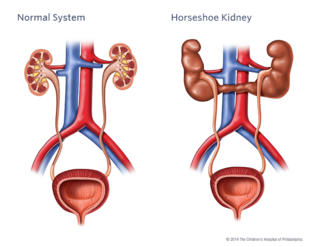What is a horseshoe kidney?
Horseshoe kidney occurs in about 1 in 500 children. It occurs during fetal development as the kidneys move into their normal position from the pelvis to the flank area (area around the side, just above the waist).
As the kidneys of the fetus rise from the pelvic area, they fuse together at the lower end or base. By fusing, they form a "U" shape, which gives it the name "horseshoe."

A horseshoe kidney consists of two normal functioning kidneys attached by a band of tissue called the isthmus.
Signs and symptoms
Even though a horseshoe kidney is congenital (present at birth), one-third of children will have no symptoms and the condition often goes undetected. In patients who do have symptoms, horseshoe kidney is often diagnosed as the result of an infection, an obstruction or a kidney stone.
Testing and diagnosis
Since prenatal ultrasound is now a part of the routine care during pregnancy, many renal abnormalities are discovered before the baby is even born. Other horseshoe kidneys may be uncovered during an X-ray or ultrasound for a different reason.
Treatment
As long as your child’s ultrasound is normal and he is not experiencing any symptoms, treatment may not be necessary. Your doctor will recommend the most appropriate course of treatment for your child.
It is known that children with a horseshoe kidney are at an increased risk of kidney stone formation and a ureteropelvic junction obstruction (narrowing where the ureter meets the kidney).
If your child has unexplained abdominal pain or flank pain, unexplained nausea, vomiting or hematuria (bloody urine), we will reassess the kidney with an ultrasound.
Reviewed by: Division of Urology
Date: May 2011
Resources to help
Division of Urology Resources
Caring for a child with an illness or injury can be overwhelming. We have resources to help you find answers to your questions and feel confident in the care you are providing your child.
